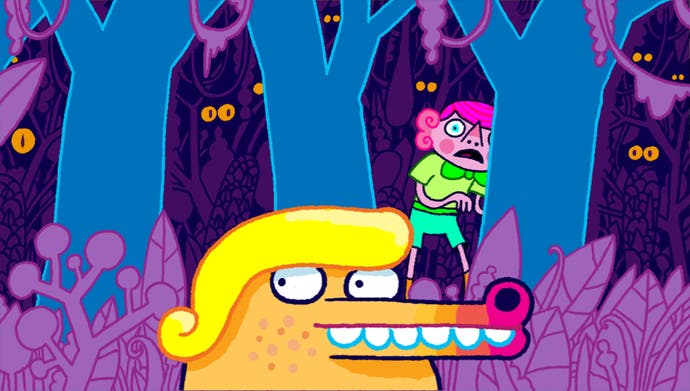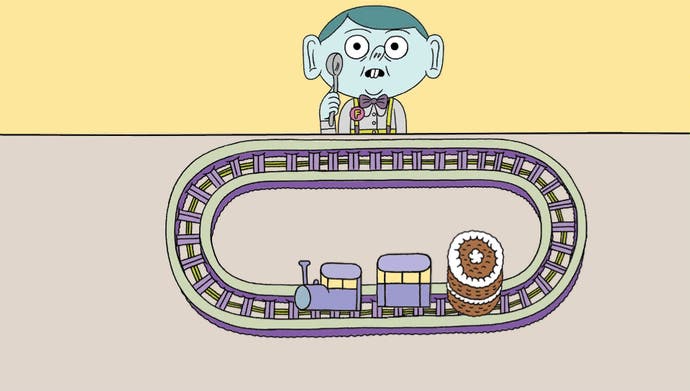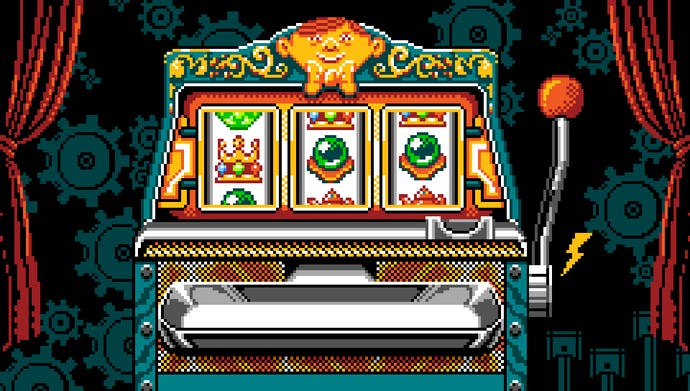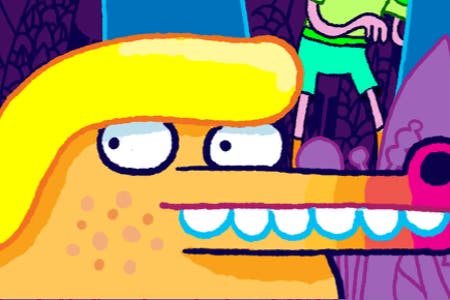Frobisher Says Review
Worth repeating?
Imagine WarioWare conceptualised by a team of asymmetric-fringed hipsters in an exposed-brickwork warehouse in Shoreditch. I don't know anything about the development team, in fairness, but that's what I imagined the moment I clapped eyes on Frobisher Says. With its knowing nudge-and-wink wackiness it is, superficially at least, the wearing-a-scarf-indoors of gaming.
What a nice surprise, then, to discover that once I stopped being a sneering idiot, I came to delight in its eccentricities, pretty artwork and occasional flashes of brilliance.
And what a shame, in the end, to be left wondering what a difference more consideration for the overall game design, rather than its individual components, could have made.
Before we go any further, I should point out that Frobisher Says is, brilliantly, free (made available to those who pre-ordered Vita so far and coming to everyone else soon) and it's a game you should download and play when you can. As a showcase for Vita's feature set, it's infinitely more fun than the unfathomably dull Welcome Park.

The reason I'm disappointed is that I can see how, with its distinctive style and surreal silliness, it could be tweaked and fleshed out a bit into something far more fulfilling, rather than the fondle-and-forget freebie it is today.
Frobisher Says is nakedly designed in the mould of Nintendo's original micro-game classic WarioWare. The titular, irritating little squirt, voiced expertly (and possibly a little too annoyingly for some) by Kevin Eldon, barks an instruction at the start of each game for you to carry out.
"Draw a face on this rare egg"; "Chop Mr Sanderson's cactus"; "Poke the otter with a stick"; "Prise apart my clams". With pleasure, sir.
There's just shy of 40 games in the free version, with the option to buy 15 extra mini-games for £1.59 as part of the Super Fun Pack. Every key hardware feature is covered at some point, with predictably mixed results.
Take front and rear touch. The most mundane example is found in "Play me at snap", as lifeless as it sounds. "Dry my unfeasibly long sausage dog" is a better effort, requiring you to frantically rub the front and back panels. And then there's "Plug the leaks", where simple multi-touch comes to the fore to focus a blast of water on a businessman snoozing on a bench.

As indebted as it is to the WarioWare blueprint, Frobisher has some neat ideas of its own. Using the front camera, one game asks you to "Look away now". Do it properly and you will only ever see a nervous-looking boy. Cheat and, well, what happens is certainly funny.
There's also a few noteworthy riffs on the format that stretch out across multiple mini-games: remembering something that will be suddenly be required later on, for instance; or the clever use of photos in a platform-based caper; or a moment where you are asked to consider whether you are enjoying the game at all.
Structurally it's all very basic. You either play a fixed-length round, with mini-games chucked at you in a random order (often with irritating repetition), where the aim is to achieve the best overall score; or sudden-death, where you survive as long as you can, one game at a time.
There's pass-the-console multiplayer for up to eight people, with an option to set the number of rounds, worth it for a collective chuckle, and that's about your lot in terms of content.
As well-made as many of the micro-games are, as it stands Frobisher Says rather misses the point of what made WarioWare such a compelling experience.

It's a question of structure. Throughout Nintendo's series, the many micro-games were always a mixed bag of quality and largely not the point in themselves. It was the blink-and-you'll miss it action, the themed groupings, and the increasingly white-knuckle shifts in speed, that turned it all into a thrillingly instinctive, moreish test of reflexes.
Such obvious attention has been lavished on the look of each individual component here, that they have a tendency to revel a little too much in their own cleverness at times, outstaying their welcome rather than adding to the whole.
Another giveaway is the lack of thought given to the player's environment. If I'm in a badly-lit room, or lazing on the sofa, or on crowded public transport, there is no way for me to filter out the camera and mic-based games, effectively rendering the game unplayable for any decent length of time.
It's a tech demo first and a game second in that sense. As a launch freebie designed to show off Vita's talents, it's perhaps churlish to criticise it for that. But I'd rather not settle for an experience that could yet be improved.
A major concern with Sony's handheld strategy was software pricing, something the company has answered encouragingly so far with little gems like MotorStorm RC made available for under a fiver.

Having shown an understanding of the need to offer bite-sized, impulse-priced gaming - yes, all that stuff you get on phones - to complement the likes of FIFA and Uncharted, it'd be nice to see the content supported in a similar way.
A good example is ustwo's Whale Trail on iOS - a completely different game to Frobisher Says, but one that, upon its original release, had all the Shoreditch surface but lacked a sense of purpose. That all changed with a free content update, which added the superb Challenge Mode, at last fulfilling the title's potential.
This game would clearly benefit from a more rigid and thought-out structure for a start: focus for some of the better ideas found within.
Whether or not it gets any further development attention, I don't know. But any game that instructs you to "smile at the ladies, don't smile at the badgers" does at least deserve it.

